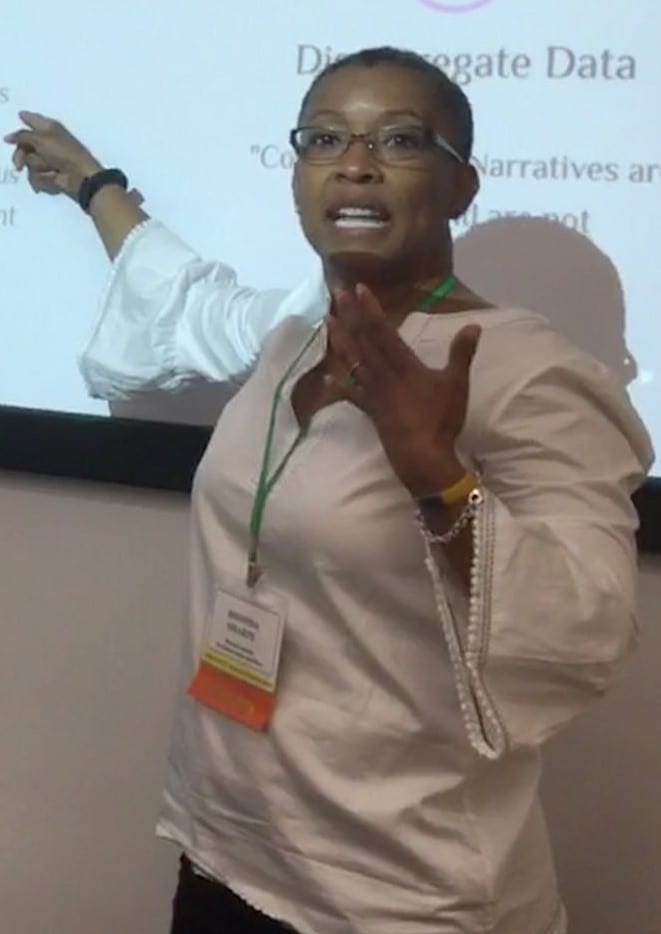Vision
An inclusive society where policy research addresses the economic, social, cultural, and political well-being of Asian, Black, Hispanic, Indigenous American, and Multiracial women. Our commitment is symbolized in the design of our website:
Pink – represents the compassion we have for the vulnerable – Asian, Black, Hispanic, Indigenous American and Multiracial women.
Purple – represents the dignity we believe every woman deserves independent of her economic, political, or social status.
Green – represents our hope that it will not take another generation for society to be inclusive of the needs of Asian, Black, Hispanic, Indigenous American, and Multiracial women.
Mission
Our goal is to disseminate research that influences public policy and promotes:
1. Equitable access to science, technology, engineering, and mathematics (STEM) education,
2. Equitable access to health care, employment, housing, and legal representation,
3. Equity in:
a) employment – earnings, compensation, and promotion;
b) family structure – parental rights and marital status;
c) health outcomes – reproductive rights, mental health, health coverage, and family care;
d) penal punishment.
Challenges
Often, research focused on women does not disaggregate data findings by race, ethnicity, and gender. We posit that failure to disaggregate data by gender is biased and treats White women as the “norm.” Failure to disaggregate race/ethnicity data by gender is similarly biased and treats men as the “norm.” Additionally, using the term “women of color” is problematic, as it wrongly assumes that Asian, Black, Hispanic, Indigenous American, and Multiracial women are a homogeneous group. The aggregation of these women into a single group produces ineffective policies that do not address the needs of the most vulnerable.
When research on women includes nonwhite women, the results are often limited to Black and Hispanic women and are presented using a deficit frame; hence, the findings are centered on White women. Our research reports address this flaw by centering on Asian, Black, Hispanic, Indigenous American, and Multiracial (when data allow) women. Our analysis will avoid cross-race/ethnicity comparisons unless the study examines intra-gender inequality.
WISER’s research also considers the influence of socioeconomic status on outcomes. When data allow, we will drill down the data to examine the impact of family status (single vs. married), presence of children, educational attainment, and other factors that may affect the social and economic well-being of Asian, Black, Hispanic, Indigenous American, and Multiracial women.
Expanding Women-focused Research
WISER’s mission is to expand women-focused policy research to include the social, economic, cultural, and political well-being of Asian, Black, Hispanic, Indigenous American, and Multiracial women in the United States. WISER conducts and disseminates research on the well-being of Asian, Black, Hispanic, Indigenous American, and Multiracial women; conducts policy analysis to identify and minimize disparate impact to Asian, Black, Hispanic, Indigenous American, and Multiracial women; and proposes public policies that are inclusive of the needs of Asian, Black, Hispanic, Indigenous American and Multiracial women.
Advocating for WISER Public Policy
WISER advocates for disaggregating data by the characteristics that lived experiences and research show to influence an outcome. Disaggregating data is the mechanics of subdividing the data by these characteristics. We posit that the disaggregation of data by race, ethnicity, and gender will draw different conclusions for each group instead of the broad umbrella of “women of color.” Such an approach thereby produces a society with effective policies that are inclusive of the needs of these vulnerable groups. We believe the well-being of Asian, Black, Hispanic, Indigenous American, and Multiracial women is vital for economic progress.
Interested in learning more?



